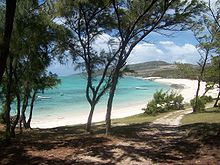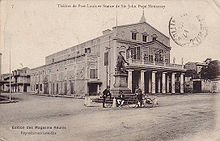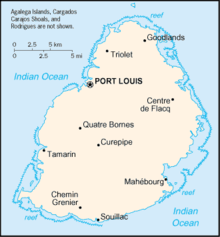|
|
|
| |
| |
| |
 |
About Mauritius |
|
|
| |
Mauritius (pronounced Mauritian Creole: Moris; French: Maurice, pronounced: officially the Republic of Mauritius (Mauritian Creole: Republik Moris; French: République de Maurice) is an island nation off the southeast coast of the African continent in the southwest Indian Ocean, about 900 kilometres (560 mi) east of Madagascar. In addition to the island of Mauritius, the Republic includes the islands of Cargados Carajos, Rodrigues and the Agalega Islands. Mauritius Island is part of the Mascarene Islands, with the French island of Réunion 200 km (120 mi) to the southwest and the island of Rodrigues 570 km (350 mi) to the northeast.
Uninhabited by humans until the 17th century, the island was ruled first by the Dutch and then by the French after the former abandoned it. The British took control during the Napoleonic Wars and Mauritius became independent from the UK in 1968. Mauritius's area is 2040 km2 with Port Louis for capital. It is a parliamentary republic and is a member of the Southern African Development Community, the Common Market for Eastern and Southern Africa, the African Union, La Francophonie and the Commonwealth of Nations. Mauritius has an upper middle income economy.
The main languages spoken in Mauritius are Mauritian Creole, French and English. English is the only official language but the lingua franca is Mauritian Creole and the newspapers and television programmes are usually in French.[7] Ethnically, the majority of the estimated 1,300,000 people are of Indian descent but there are also many people of African descent on the island. There are also European and Chinese minorities. It is the only African nation where the majority religion is Hinduism although Christianity and Islam also have significant populations.
The island of Mauritius is renowned for having been the only known home of the dodo. First sighted by Europeans around 1600 on Mauritius, this bird was an easy prey to settlers due to its weight and inability to fly. It became extinct less than eighty years later. |
 |
|
| |
History
Mauritius was uninhabited until being permanently settled by European explorers in the 1600s.[8] The island was known to Swahili[9], Arab, and Malay sailors as early as the 10th century [10] and was originally named Dina Harobi by the Arabs.[11] The Portuguese sailors first visited it in 1507 and established a visiting base leaving the island uninhabited. Five ships of the Dutch Second Fleet were blown off course during a cyclone while on their way to the Spice Islands and landed on the island in 1598, naming it in honor of Prince Maurice of Nassau, the Stadtholder of the Netherlands.
In 1638, the Dutch established the first permanent settlement. Because of tough climatic conditions including cyclones and the deterioration of the settlement, the Dutch abandoned the island after nearly a century in 1710.[14] France, which already controlled the neighboring Île Bourbon (now Réunion) took control of Mauritius in 1715 and later renamed it Île de France (Isle of France). Under French rule, the island developed a prosperous economy based on sugar production.
In the Napoleonic Wars (1803–1815) the British set out to gain control of the island. Despite winning the Battle of Grand Port, Napoleon's only naval victory over the British, the French surrendered to a British invasion at Cap Malheureux three months later. They formally surrendered on 3 December 1810, on terms allowing settlers to keep their land and property and to use the French language and law of France in criminal and civil matters. Under British rule, the island's name reverted to the original one. Mauritius then went on to become independent in 1968. |
 |
|
| |
Geography
Together with Réunion and Rodrigues, Mauritius is part of the Mascarene Islands. This archipelago was formed in a series of undersea volcanic eruptions 8-10 million years ago, as the African plate drifted over the Réunion hotspot. They are no longer volcanically active, and the hotspot now rests under Réunion. The island of Mauritius itself is formed around a central plateau, with its highest peak in the southwest, Piton de la Petite Rivière Noire at 828 metres (2,717 ft). Around the plateau, the original crater can still be distinguished from several mountains.
The island's capital and largest city is Port Louis, in the northwest. Other important towns are Rose-Hill and Beau-Bassin, Curepipe, Vacoas, Phoenix, Quatre Bornes. |
 |
|
| |
|
| |
|
|
|
|
|
|
|
| |
|